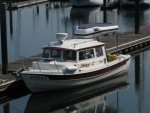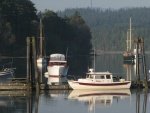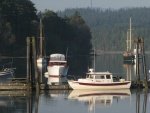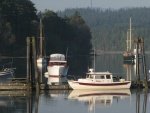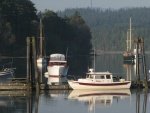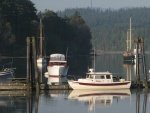Casey
New member
- Joined
- Nov 2, 2003
- Messages
- 1,094
- Reaction score
- 0
- C Dory Year
- 2006
- C Dory Model
- 23 Venture
- Hull Identification Number
- GXK23017A606
- Vessel Name
- "Dessert 1st"
George (Kerri On) is back on the road after a great visit here in Arizona. We finished making the "charging cables" for both Kerri On and Katmai, and George reports that his cable is working very well,and makes "boaterhoming" easier, and one battery is conveniently recharged while the boat is on the trailer.
As it turned-out we both have Ford F150 trucks. Both trucks have towing packages so are fit with both a 4-flat connector for a trailer as well as a round 7 connector RV-type plug.
George used #12 wire for his cable, since I already had #10 cable I chose to use it. #12 cable is sufficient, and somewhat easier to work with. If I was to redo the cable I'd use #12.
Both George and I had previously installed fused 12v sockets in the cockpit to power a small fan/light/laptop. Those 12v sockets are wired directly to one or both battery's (not through the Perko switch). The boat-end of the cable simply has a "male" 12v plug which connects to a 12v socket, and recharges the selected battery. The truck end of the cable uses a round connector which is only connected to the switched auxiliary connector, plus the ground. The trailer lights/turn signal wiring is completely separate.
That's the quick version of our project. There were a few changes of direction, and a couple of discovery's in both truck's wiring/fusing systems, a few blown fuses, and one errant 3/4" hole drilled in Katmai, but it finally worked out well. The lesson we learned is to rethink an original plan, an go with the simplest option available! I'll save the full version of the charging cable story for a campfire story somewhere/sometime.... With enough wine, it would be pretty humorous.
Casey
Lake Montezuma,AZ
As it turned-out we both have Ford F150 trucks. Both trucks have towing packages so are fit with both a 4-flat connector for a trailer as well as a round 7 connector RV-type plug.
George used #12 wire for his cable, since I already had #10 cable I chose to use it. #12 cable is sufficient, and somewhat easier to work with. If I was to redo the cable I'd use #12.
Both George and I had previously installed fused 12v sockets in the cockpit to power a small fan/light/laptop. Those 12v sockets are wired directly to one or both battery's (not through the Perko switch). The boat-end of the cable simply has a "male" 12v plug which connects to a 12v socket, and recharges the selected battery. The truck end of the cable uses a round connector which is only connected to the switched auxiliary connector, plus the ground. The trailer lights/turn signal wiring is completely separate.
That's the quick version of our project. There were a few changes of direction, and a couple of discovery's in both truck's wiring/fusing systems, a few blown fuses, and one errant 3/4" hole drilled in Katmai, but it finally worked out well. The lesson we learned is to rethink an original plan, an go with the simplest option available! I'll save the full version of the charging cable story for a campfire story somewhere/sometime.... With enough wine, it would be pretty humorous.
Casey
Lake Montezuma,AZ

